Analysis of Mobile Cloud Computing Systems and SaaS Schemes
VerifiedAdded on 2023/01/11
|5
|930
|73
Report
AI Summary
This report provides an overview of mobile cloud computing and Software-as-a-Service (SaaS) schemes. It explains how mobile applications are built and hosted using cloud technology, highlighting SaaS and Mobile Backend-as-a-Service (MBaaS) models. The report uses Netflix as a case study, illustrating how the streaming service leverages SaaS. It details the benefits of mobile cloud computing, such as scalability, device compatibility, cost-effectiveness, and automatic updates. The architectural view of Netflix, including the use of Hadoop Distributed File System (HDFS) and Amazon Web Services (S3) for data storage and management, is also examined. The report also discusses the benefits of S3, including the ability to manage and synchronize Hadoop clusters, scalability, and granular versioning. The report concludes by referencing relevant academic sources.
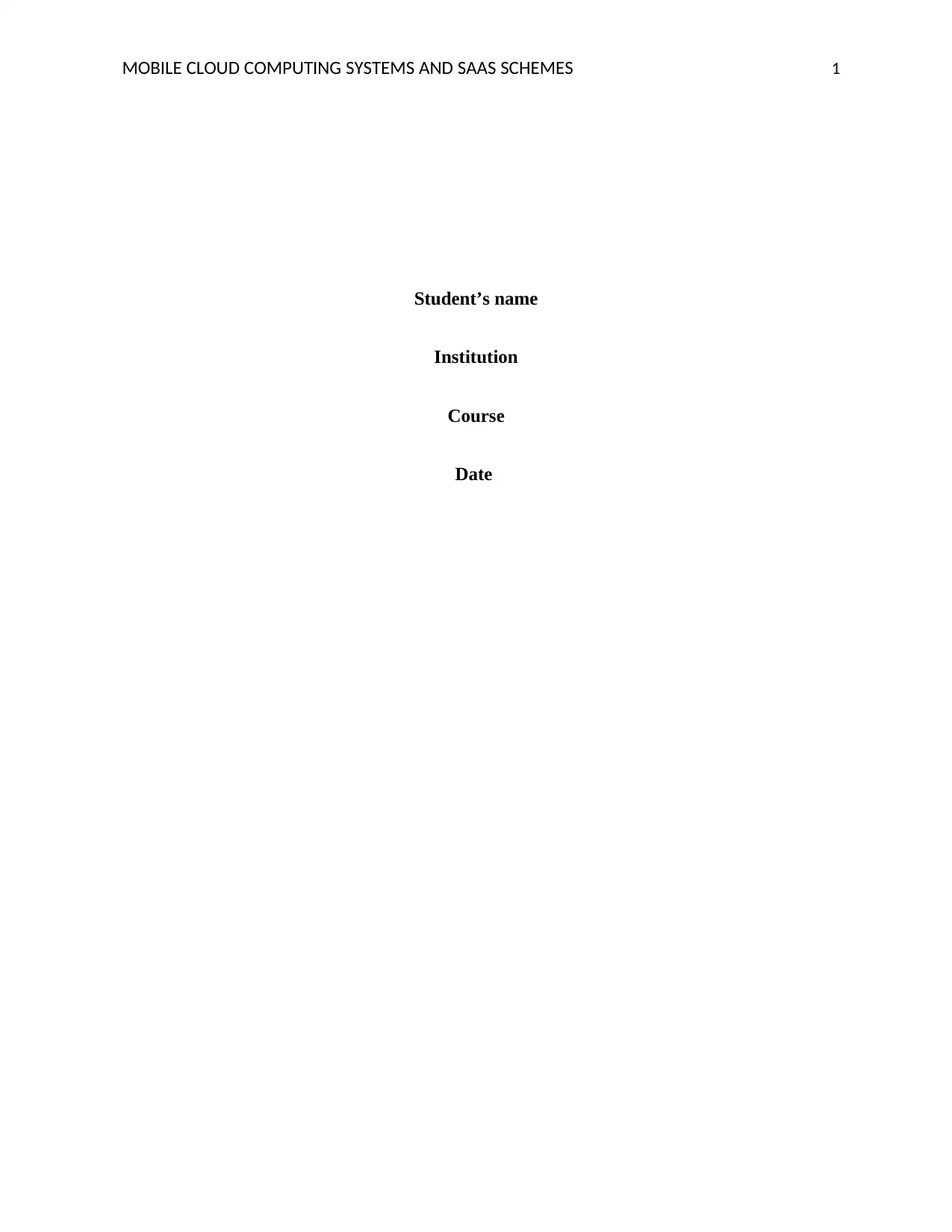
MOBILE CLOUD COMPUTING SYSTEMS AND SAAS SCHEMES 1
Student’s name
Institution
Course
Date
Student’s name
Institution
Course
Date
Paraphrase This Document
Need a fresh take? Get an instant paraphrase of this document with our AI Paraphraser
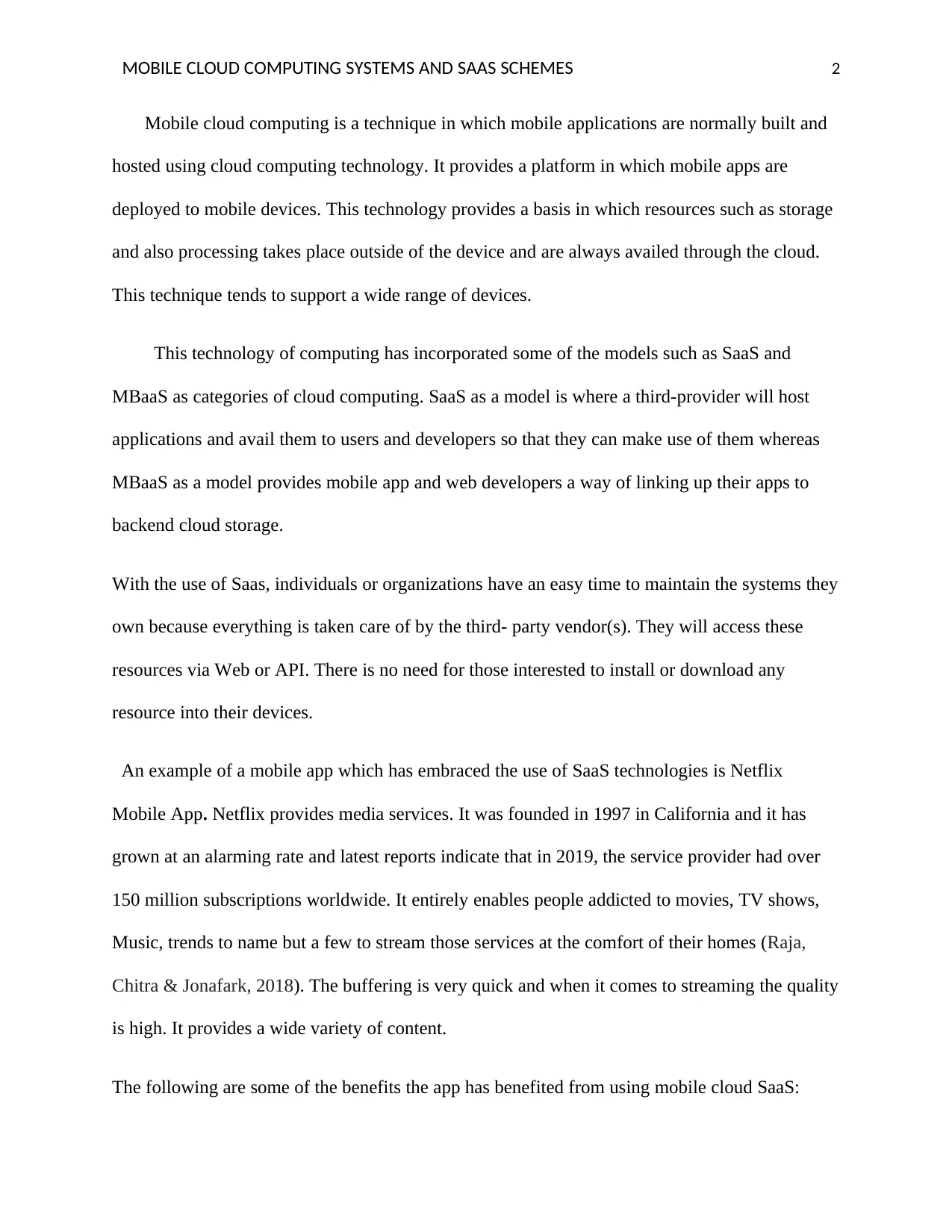
MOBILE CLOUD COMPUTING SYSTEMS AND SAAS SCHEMES 2
Mobile cloud computing is a technique in which mobile applications are normally built and
hosted using cloud computing technology. It provides a platform in which mobile apps are
deployed to mobile devices. This technology provides a basis in which resources such as storage
and also processing takes place outside of the device and are always availed through the cloud.
This technique tends to support a wide range of devices.
This technology of computing has incorporated some of the models such as SaaS and
MBaaS as categories of cloud computing. SaaS as a model is where a third-provider will host
applications and avail them to users and developers so that they can make use of them whereas
MBaaS as a model provides mobile app and web developers a way of linking up their apps to
backend cloud storage.
With the use of Saas, individuals or organizations have an easy time to maintain the systems they
own because everything is taken care of by the third- party vendor(s). They will access these
resources via Web or API. There is no need for those interested to install or download any
resource into their devices.
An example of a mobile app which has embraced the use of SaaS technologies is Netflix
Mobile App. Netflix provides media services. It was founded in 1997 in California and it has
grown at an alarming rate and latest reports indicate that in 2019, the service provider had over
150 million subscriptions worldwide. It entirely enables people addicted to movies, TV shows,
Music, trends to name but a few to stream those services at the comfort of their homes (Raja,
Chitra & Jonafark, 2018). The buffering is very quick and when it comes to streaming the quality
is high. It provides a wide variety of content.
The following are some of the benefits the app has benefited from using mobile cloud SaaS:
Mobile cloud computing is a technique in which mobile applications are normally built and
hosted using cloud computing technology. It provides a platform in which mobile apps are
deployed to mobile devices. This technology provides a basis in which resources such as storage
and also processing takes place outside of the device and are always availed through the cloud.
This technique tends to support a wide range of devices.
This technology of computing has incorporated some of the models such as SaaS and
MBaaS as categories of cloud computing. SaaS as a model is where a third-provider will host
applications and avail them to users and developers so that they can make use of them whereas
MBaaS as a model provides mobile app and web developers a way of linking up their apps to
backend cloud storage.
With the use of Saas, individuals or organizations have an easy time to maintain the systems they
own because everything is taken care of by the third- party vendor(s). They will access these
resources via Web or API. There is no need for those interested to install or download any
resource into their devices.
An example of a mobile app which has embraced the use of SaaS technologies is Netflix
Mobile App. Netflix provides media services. It was founded in 1997 in California and it has
grown at an alarming rate and latest reports indicate that in 2019, the service provider had over
150 million subscriptions worldwide. It entirely enables people addicted to movies, TV shows,
Music, trends to name but a few to stream those services at the comfort of their homes (Raja,
Chitra & Jonafark, 2018). The buffering is very quick and when it comes to streaming the quality
is high. It provides a wide variety of content.
The following are some of the benefits the app has benefited from using mobile cloud SaaS:
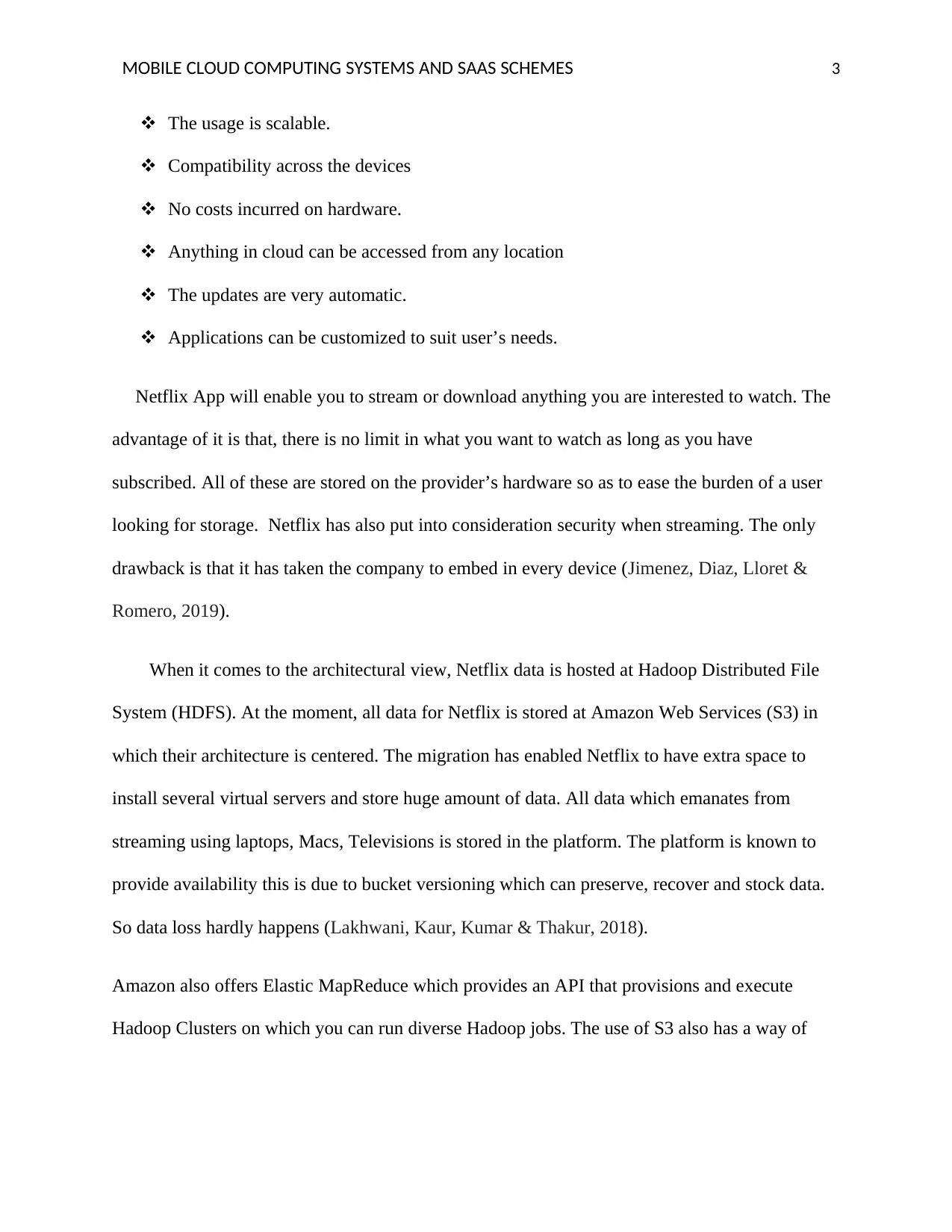
MOBILE CLOUD COMPUTING SYSTEMS AND SAAS SCHEMES 3
The usage is scalable.
Compatibility across the devices
No costs incurred on hardware.
Anything in cloud can be accessed from any location
The updates are very automatic.
Applications can be customized to suit user’s needs.
Netflix App will enable you to stream or download anything you are interested to watch. The
advantage of it is that, there is no limit in what you want to watch as long as you have
subscribed. All of these are stored on the provider’s hardware so as to ease the burden of a user
looking for storage. Netflix has also put into consideration security when streaming. The only
drawback is that it has taken the company to embed in every device (Jimenez, Diaz, Lloret &
Romero, 2019).
When it comes to the architectural view, Netflix data is hosted at Hadoop Distributed File
System (HDFS). At the moment, all data for Netflix is stored at Amazon Web Services (S3) in
which their architecture is centered. The migration has enabled Netflix to have extra space to
install several virtual servers and store huge amount of data. All data which emanates from
streaming using laptops, Macs, Televisions is stored in the platform. The platform is known to
provide availability this is due to bucket versioning which can preserve, recover and stock data.
So data loss hardly happens (Lakhwani, Kaur, Kumar & Thakur, 2018).
Amazon also offers Elastic MapReduce which provides an API that provisions and execute
Hadoop Clusters on which you can run diverse Hadoop jobs. The use of S3 also has a way of
The usage is scalable.
Compatibility across the devices
No costs incurred on hardware.
Anything in cloud can be accessed from any location
The updates are very automatic.
Applications can be customized to suit user’s needs.
Netflix App will enable you to stream or download anything you are interested to watch. The
advantage of it is that, there is no limit in what you want to watch as long as you have
subscribed. All of these are stored on the provider’s hardware so as to ease the burden of a user
looking for storage. Netflix has also put into consideration security when streaming. The only
drawback is that it has taken the company to embed in every device (Jimenez, Diaz, Lloret &
Romero, 2019).
When it comes to the architectural view, Netflix data is hosted at Hadoop Distributed File
System (HDFS). At the moment, all data for Netflix is stored at Amazon Web Services (S3) in
which their architecture is centered. The migration has enabled Netflix to have extra space to
install several virtual servers and store huge amount of data. All data which emanates from
streaming using laptops, Macs, Televisions is stored in the platform. The platform is known to
provide availability this is due to bucket versioning which can preserve, recover and stock data.
So data loss hardly happens (Lakhwani, Kaur, Kumar & Thakur, 2018).
Amazon also offers Elastic MapReduce which provides an API that provisions and execute
Hadoop Clusters on which you can run diverse Hadoop jobs. The use of S3 also has a way of
⊘ This is a preview!⊘
Do you want full access?
Subscribe today to unlock all pages.

Trusted by 1+ million students worldwide
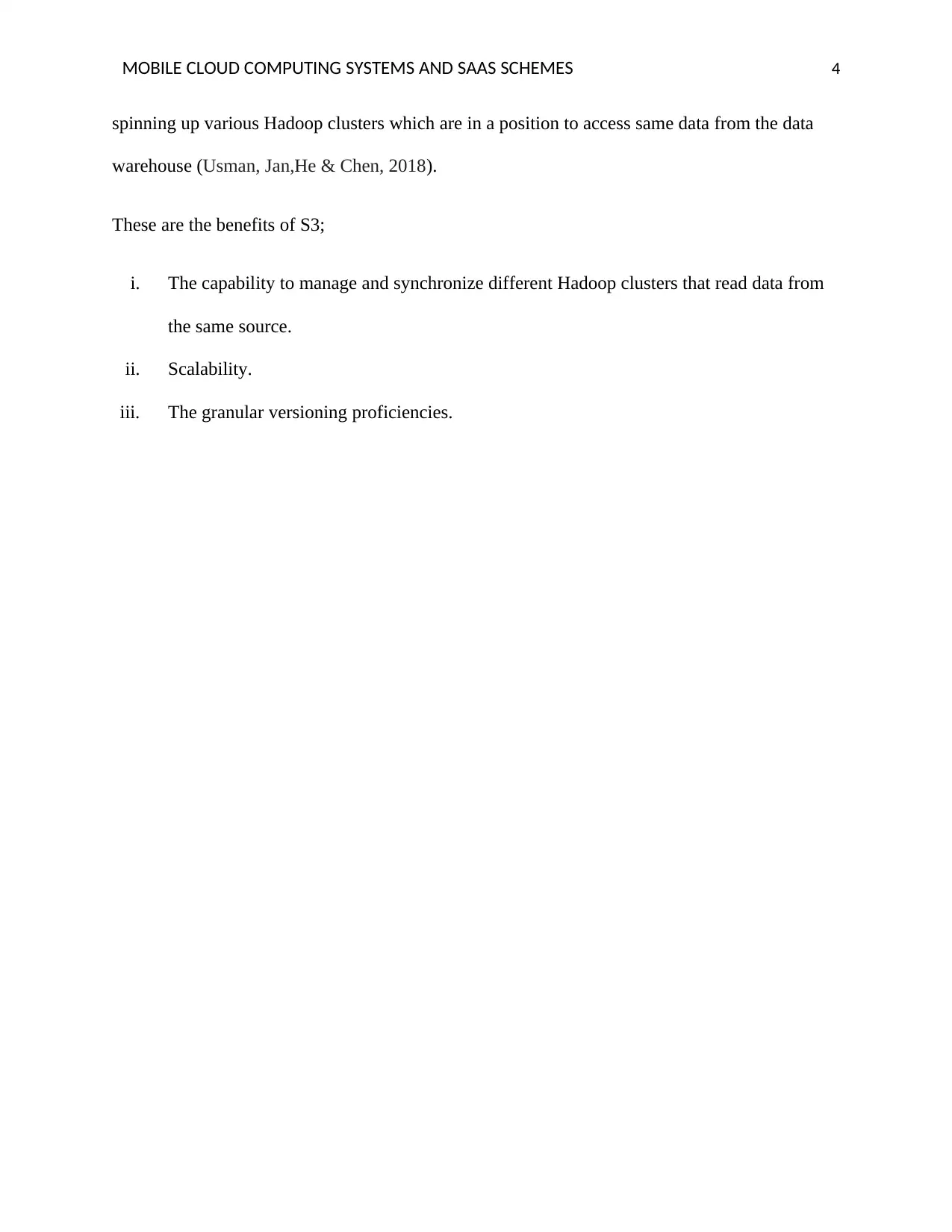
MOBILE CLOUD COMPUTING SYSTEMS AND SAAS SCHEMES 4
spinning up various Hadoop clusters which are in a position to access same data from the data
warehouse (Usman, Jan,He & Chen, 2018).
These are the benefits of S3;
i. The capability to manage and synchronize different Hadoop clusters that read data from
the same source.
ii. Scalability.
iii. The granular versioning proficiencies.
spinning up various Hadoop clusters which are in a position to access same data from the data
warehouse (Usman, Jan,He & Chen, 2018).
These are the benefits of S3;
i. The capability to manage and synchronize different Hadoop clusters that read data from
the same source.
ii. Scalability.
iii. The granular versioning proficiencies.
Paraphrase This Document
Need a fresh take? Get an instant paraphrase of this document with our AI Paraphraser
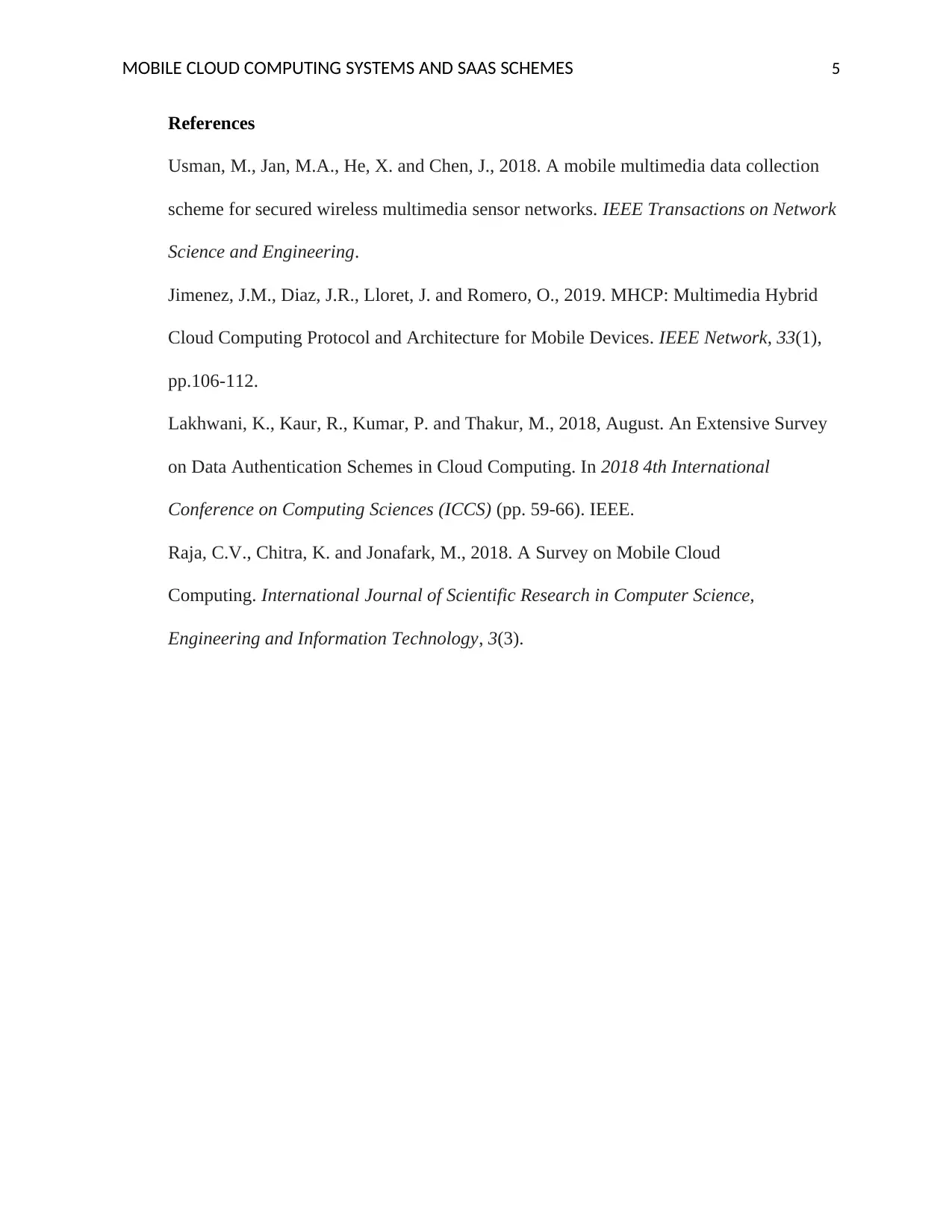
MOBILE CLOUD COMPUTING SYSTEMS AND SAAS SCHEMES 5
References
Usman, M., Jan, M.A., He, X. and Chen, J., 2018. A mobile multimedia data collection
scheme for secured wireless multimedia sensor networks. IEEE Transactions on Network
Science and Engineering.
Jimenez, J.M., Diaz, J.R., Lloret, J. and Romero, O., 2019. MHCP: Multimedia Hybrid
Cloud Computing Protocol and Architecture for Mobile Devices. IEEE Network, 33(1),
pp.106-112.
Lakhwani, K., Kaur, R., Kumar, P. and Thakur, M., 2018, August. An Extensive Survey
on Data Authentication Schemes in Cloud Computing. In 2018 4th International
Conference on Computing Sciences (ICCS) (pp. 59-66). IEEE.
Raja, C.V., Chitra, K. and Jonafark, M., 2018. A Survey on Mobile Cloud
Computing. International Journal of Scientific Research in Computer Science,
Engineering and Information Technology, 3(3).
References
Usman, M., Jan, M.A., He, X. and Chen, J., 2018. A mobile multimedia data collection
scheme for secured wireless multimedia sensor networks. IEEE Transactions on Network
Science and Engineering.
Jimenez, J.M., Diaz, J.R., Lloret, J. and Romero, O., 2019. MHCP: Multimedia Hybrid
Cloud Computing Protocol and Architecture for Mobile Devices. IEEE Network, 33(1),
pp.106-112.
Lakhwani, K., Kaur, R., Kumar, P. and Thakur, M., 2018, August. An Extensive Survey
on Data Authentication Schemes in Cloud Computing. In 2018 4th International
Conference on Computing Sciences (ICCS) (pp. 59-66). IEEE.
Raja, C.V., Chitra, K. and Jonafark, M., 2018. A Survey on Mobile Cloud
Computing. International Journal of Scientific Research in Computer Science,
Engineering and Information Technology, 3(3).
1 out of 5
Related Documents
Your All-in-One AI-Powered Toolkit for Academic Success.
+13062052269
info@desklib.com
Available 24*7 on WhatsApp / Email
![[object Object]](/_next/static/media/star-bottom.7253800d.svg)
Unlock your academic potential
Copyright © 2020–2026 A2Z Services. All Rights Reserved. Developed and managed by ZUCOL.





